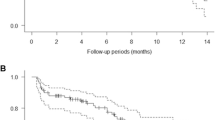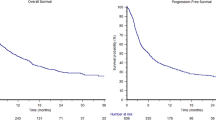Summary
Polychemotherapy and immunomodulating treatment using IL-2 and/or IFN-α produce objective responses in a proportion of advanced renal cell carcinoma patients. The goals of an improved cost effectiveness and therapeutic index of interleukin-2 and/or Interferon-α in combination with chemotherapeutic agents require the design of risk factor adapted individual therapeutic strategies for the outpatient setting. High dose i. v. IL-2 therapy in metastatic renal cell carcinoma has been proven effective [11]. Other modalities of applying IL-2 have been described [12–14] (Table 1). A cumulative risk-score identified three risk-groups with significant differences in median survival [16]. The SC use of IL-2 and INF-α has been established in the treatment of RCC [16, 23]. It appears that combination chemoimmunotherapy including p. o. retinoic acid is far more effective than single agent treatment. Further studies will have to be designed to improve therapeutic index and cost effectiveness in systemic combination therapy in metastatic RCC.
Zusammenfassung
Sowohl mit Chemotherapie als auch durch den Einsatz von Interleukin-2 und/oder Interferon-α können beim fortgeschrittenen metastasierten Nierenzellkarzinom objektive Tumorrückbildungen erzeugt werden. Ziel moderner Chemoimmuntherapiestrategien ist es, für Patienten mit fortgeschrittenem Nierenzellkarzinom individuelle, an das Risikoprofil der Patienten adaptierte effektive Therapiestrategien im ambulanten Rahmen zu entwickeln. Die signifikante Wirksamkeit der hochdosierten i. v. IL-2-Gabe konnte zuvor nachgewiesen werden [11]. Unter Beachtung der Nebenwirkungen und einer effektiven Palliation bei optimaler Dosis-Wirkungs-Beziehung wurden weitere Applikationsformen untersucht ([12–14], Tabelle 1). Durch einen Risikoscore konnten drei signifikant differierende Überlebensgruppen unterschieden werden [16]. Etabliert werden konnte die immunmodulierende, ambulante Therapie mit s. c. appliziertem rIL-2 und rINF-α [16, 23]. Die kombinierte Chemoimmuntherapie scheint den monotherapeutischen Verfahren überlegen zu sein. Verschiedene Therapieansätze, vor allem auch unter Einschluß oraler Retinoide, befinden sich derzeit im Therapieoptimierungsstadium. Die Indikation zur kombinierten Chemoimmuntherapie beim fortgeschrittenen Nierenzellkarzinom bleibt weiterhin der Prüfung im Rahmen prospektiv randomisierter Behandlungsreihen vorbehalten.
Similar content being viewed by others
Author information
Authors and Affiliations
Rights and permissions
About this article
Cite this article
Atzpodien, J., Buer, J., Sel, S. et al. Chemoimmunotherapy in the systemic treatment of advanced renal carcinoma. Urologe 38, 474–478 (1999). https://doi.org/10.1007/s001200050316
Published:
Issue Date:
DOI: https://doi.org/10.1007/s001200050316




